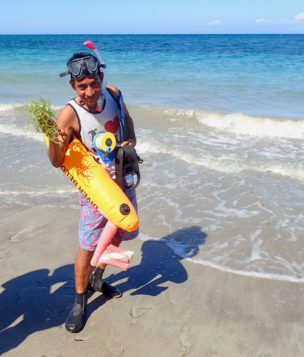
Amos Da Costa | Photo: Christina Saylor
On a bright quiet morning last May, a boat and its captain rested patiently on the tropical seas around Ataúro Island in Timor-Leste. A reflection of the island’s rugged coastline glimmered on the water’s glasslike surface as three orange buoys glided silently along, marking the presence of scuba divers. As the captain monitored the seas, the divers explored Watu Aii, a sloping reef with a dense flourish of colorful corals and lively fish.
It seemed a sleepy morning, until a riot of hoots and hollers erupted near one of the buoys. One voice rose above the others shouting, “Mola mola! Mola mola!”
The Mola mola or ocean sunfish is a fantastic-looking creature that rises from deep waters to enlist cleaner fish and seabirds in ridding its awkward body of parasites. It is the largest bony fish on the planet; fully grown, a Mola mola can reach the size of a pick-up truck.
The voice belonged to Amos Da Costa, a Dive and Science Assistant with Blue Ventures. He was leading a dive to help a group of volunteers learn to identify fish and coral species—a task he carries out enthusiastically.
Amos, who grew up on Ataúro, has had many sea-based roles, from fisherman to seaweed exporter to captain and engineer. In his work with Blue Ventures, he is now contributing to efforts to help conserve and protect Ataúro’s rich marine environments. This journey illustrates how change is manifesting for the island and its communities, which have relied on the sea for food and income for generations. This longstanding way of life has become less sustainable as increasing population, over-fishing, globalisation, and climate change increase demands on marine resources and impact the health of vital habitats.
Ataúro: a biodiversity hotspot in need of conservation
Developing solutions
As Asia’s youngest country, Timor-Leste faces the challenges of a developing nation with limited resources. While environmental protection and stability are embedded in Timorese culture, immediate conservation needs require support from international partners. Blue Ventures is working in Timor-Leste with a collaborative, community-first approach to support the identification and implementation of conservation solutions. This includes collecting data to inform policies, engaging communities, and partnering with local and national decision-makers as well as other NGOs.
The sighting of a Mola mola in Timor-Leste is rare, but not surprising. The country sits within the Coral Triangle, an area in Southeast Asia that is home to more than three-quarters of known coral species and nearly 40 percent of known coral-reef fish species. An array of other sea creatures like whales, dolphins, sharks and marine turtles also live in or pass through its waters.
Sea life around the small island of Ataúro is impressive even for the coral triangle. In 2016, a study conducted by the NGO Conservation International found an astonishing diversity of fish in its surrounding reefs. Despite this richness, there are signs that the island’s marine habitats are in trouble, indicating it’s time to build capacity for marine management and promote conservation.
Current conservation efforts aim to map and monitor habitats, establish locally managed marine areas (LMMA), and develop alternative livelihoods to relieve pressure on marine resources and restore declining fish populations. These efforts cannot succeed without change and commitment from local community members like Amos.
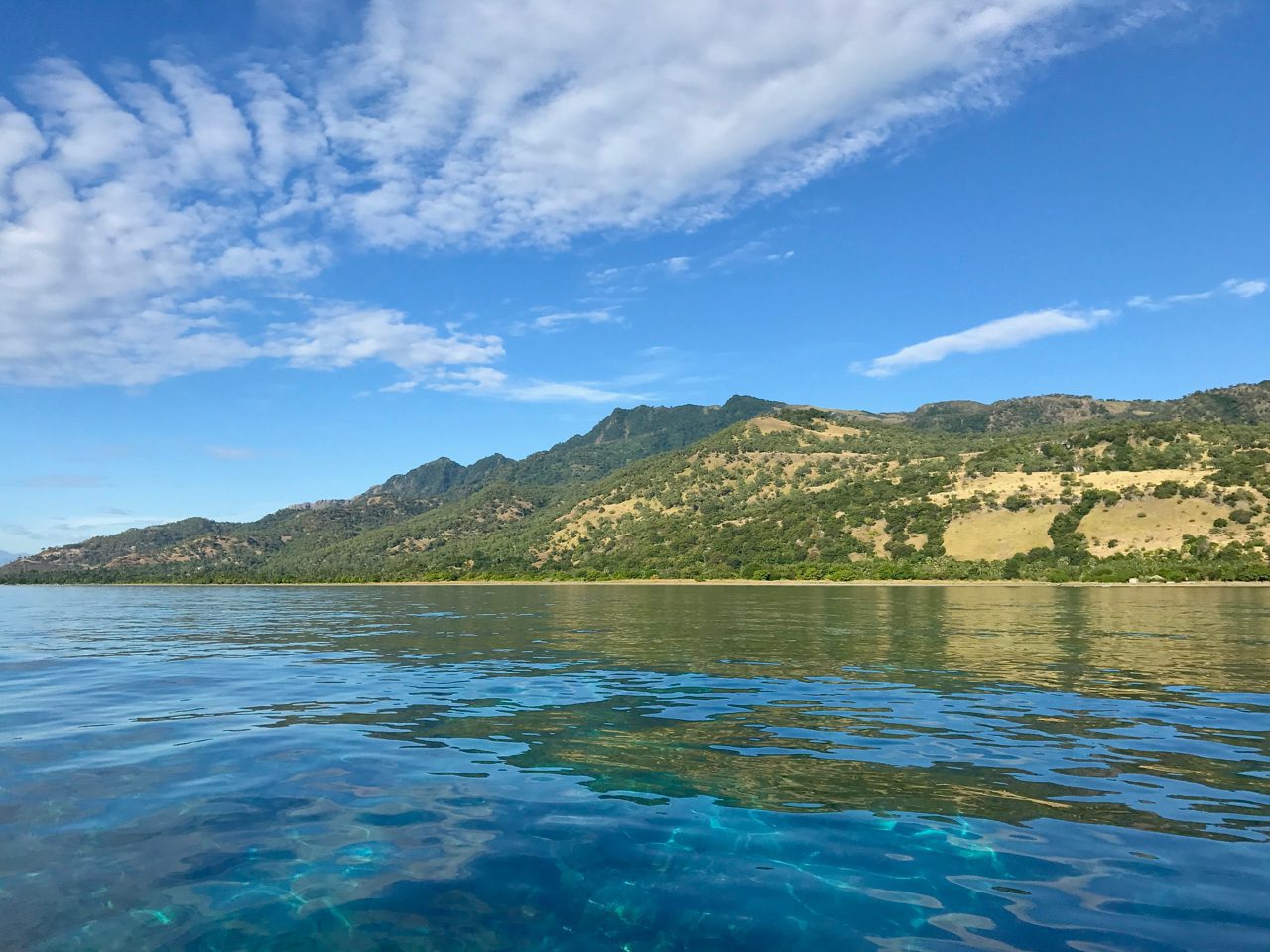
Ataúro Island | Photo: Christina Saylor
Exploring deeper seas: living in times of change
Amos is from the fishing village of Biqueli. He recalls joining his father on his family’s boat as early as age three. In the past, he says, fishermen would take anything – from turtles and sharks to fish of all kinds – to eat or sell in nearby Beloi village or at the market in Timor-Leste’s capital Dili. At the time, the marine life seemed abundant.
When Amos was a little older, fishing became a less reliable means of support for families in Biqueli. After high school, like others in his generation, he looked to new professions and took a job in construction. Amos later went on to start a seaweed exporting business. He managed this business for five years before changing professions again and taking a position as an engineer and captain on the MV Ataúro, a small passenger ferry that runs between Dili and Ataúro.
When an opportunity arose for local community members to work with Blue Ventures, Amos was excited to apply. He was accepted as a Dive and Science Assistant in May 2016. His training began with an open-water scuba certification and education about marine ecology and species identification. Mastering these skills wasn’t easy because the training was in English–his fifth language following Timor-Leste’s official languages of Tetun and Portuguese, his local dialect (Rasua), and Bahasa Indonesia.
Although it was hard work, Amos says this experience was life changing. Given his history in the sea, Amos already had significant knowledge about the fish, coral and other sea life around Ataúro. Working with Blue Ventures helped him gain a more scientific understanding of the diversity of species and the fragility of the island’s marine habitats. This sparked a new passion in Amos for both diving and conservation.
Amos is now working toward a professional Dive Master certification with the support of a scholarship from PADI. Blue Ventures’ Dive Manager Laura McGuire is working closely with Amos to help him master the necessary skills, from leading groups of volunteers underwater to delivering site briefings in English.
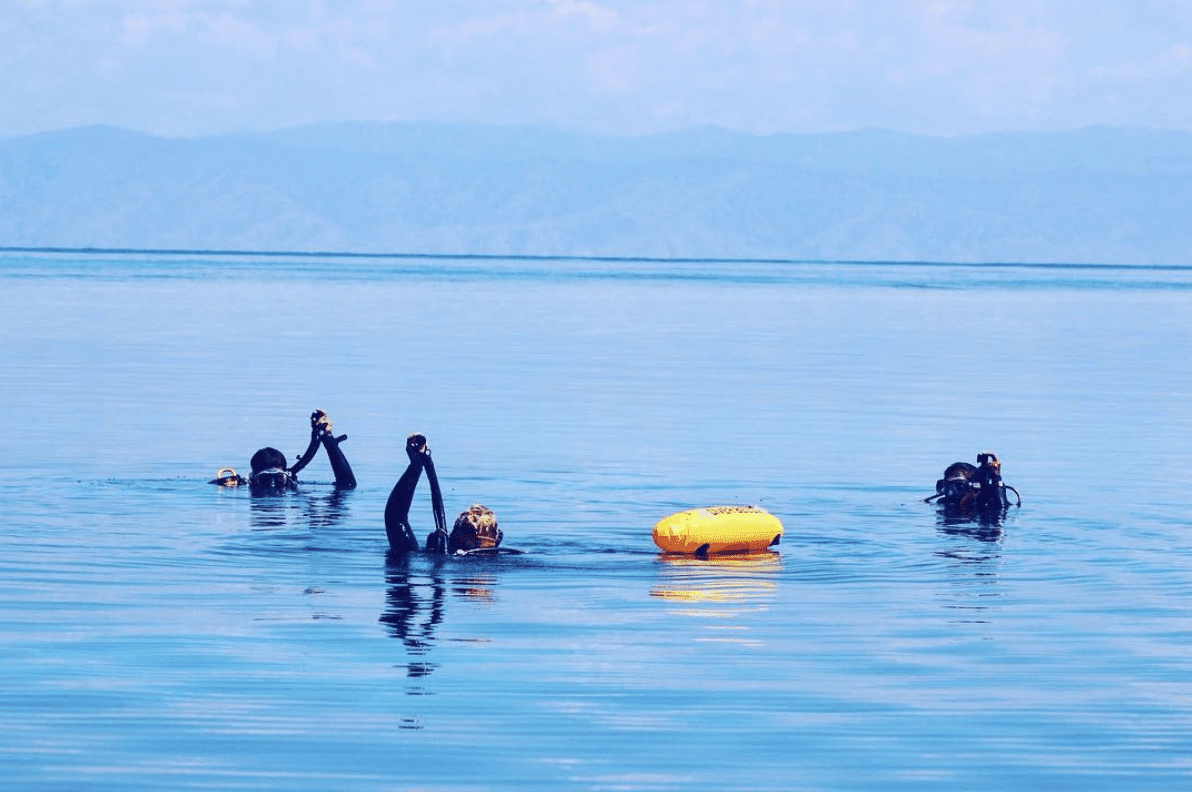
Dive training with Laura | Photo: Laura McGuire
Visions for the future
“My father and his father were fishermen. The sea fed their children and provided a living, but this way of life is no longer possible. We need to prepare for a new future by establishing ways to protect and promote our marine resources. I’m happy to have the opportunity to work in the sea with Blue Ventures and to help conserve Ataúro’s wildlife and habitats, and I look forward to sharing my skills and knowledge with Ataúro’s younger generations.”
Amos Da Costa
Amos is always ready with a joke or a grin, often quipping with friends, colleagues and Blue Ventures’ volunteers. And he will “charge” a dollar or ten for every small or large favour, whether he bestows it or you do. When it comes to talking conservation, though, he is serious and concerned. He is also pragmatic, noting there is economic value to protecting wildlife that can help incentivise communities to implement changes.
As an example, Amos points to Adara, the first village on Ataúro to establish a LMMA based on the local customary law tara bandu. LMMA’s are designed to eliminate or limit fishing from specified coastal areas to help restore wildlife populations. They are established and enforced by communities, and penalties for violation can be steep. In Adara, fines comprise significant quantities of rice, coffee, sugar and livestock that increase with each offence.
Mario Gomes, a marine biologist and conservation advocate from Adara, established an ecolodge on the beach in front of the area protected by tara bandu. Visitors who come to Adara to snorkel or dive, pay a small fee, and some stay overnight at Mario’s Place, which generates income for the community. Amos notes that this helps residents in Adara and other villages see the monetary value in conserving wildlife.
Encouraging the next generation
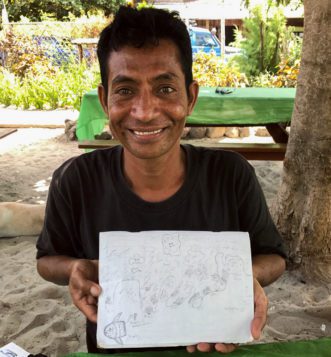
Amos with his in-progress dive site map | Photo: Christina Saylor
Amos has a seven-year-old daughter named Shirley, who lives with her mom in Dili where she attends school. Shirley loves to swim with Amos, and is delighted when she sees even the smallest fish.
Amos believes strongly in encouraging children to help keep marine animals alive. He also wants future generations to have opportunities to experience the sea as he has. For now, though, he is focused on completing his dive master training. His assignment on that day in May was to draw a map of Watu Aii that could be used for pre-dive briefings with volunteers. Amos’ map includes the usual topographic details one would expect. It also showcases a Mola-mola next to a delighted-looking scuba diver.
When asked whether he thinks Shirley will one day be a scuba diver, a smile spreads over Amos’ features. “I hope so!” he says.
Discover Timor-Leste for yourself as a marine conservation volunteer!
Special thanks to Blue Ventures volunteer Christina Saylor for writing this blog and providing the majority of the photos.
Blue Ventures would like to thank our supporters and funders including the Darwin Initiative through UK Government funding, the GEF through UNEP under the Dugong and Seagrass Project, and Wilstar.
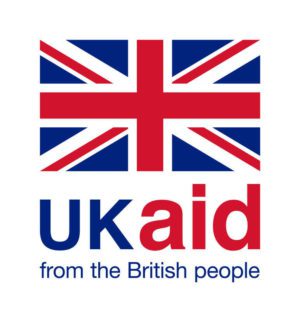
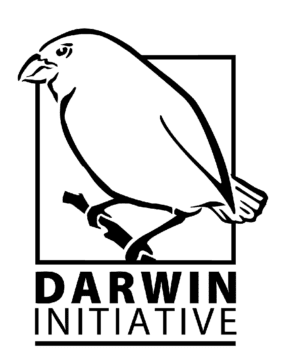


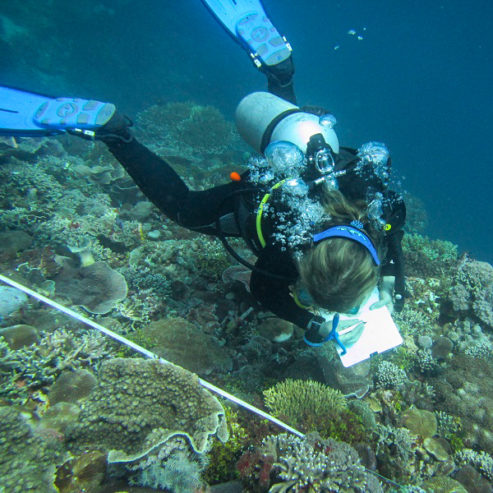
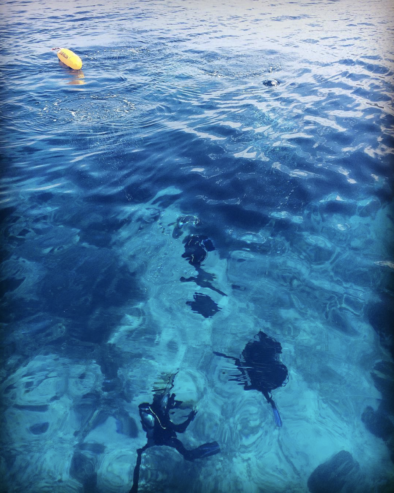


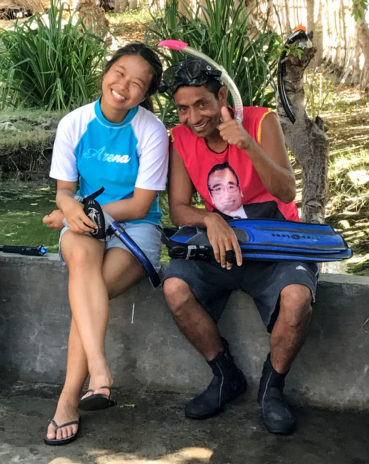
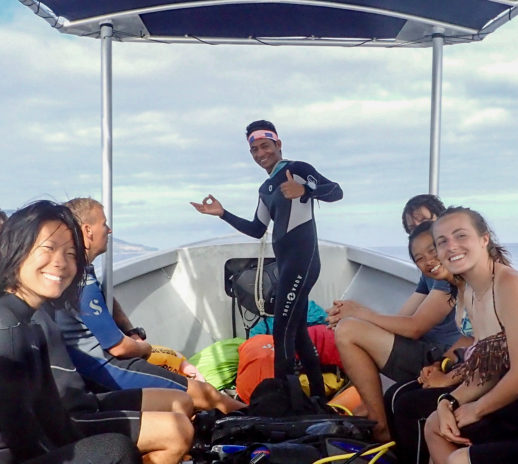

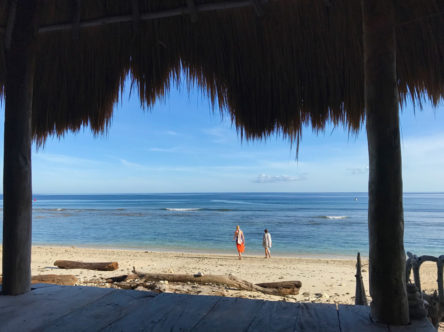
Great!
Lovely to hear Amos’ story and learn about biodiversity hot spots and the people who are working and living in them!
Thanks you for sharing. I love this article
Great! The story is very interesting, I like it.
Thank you for sharing